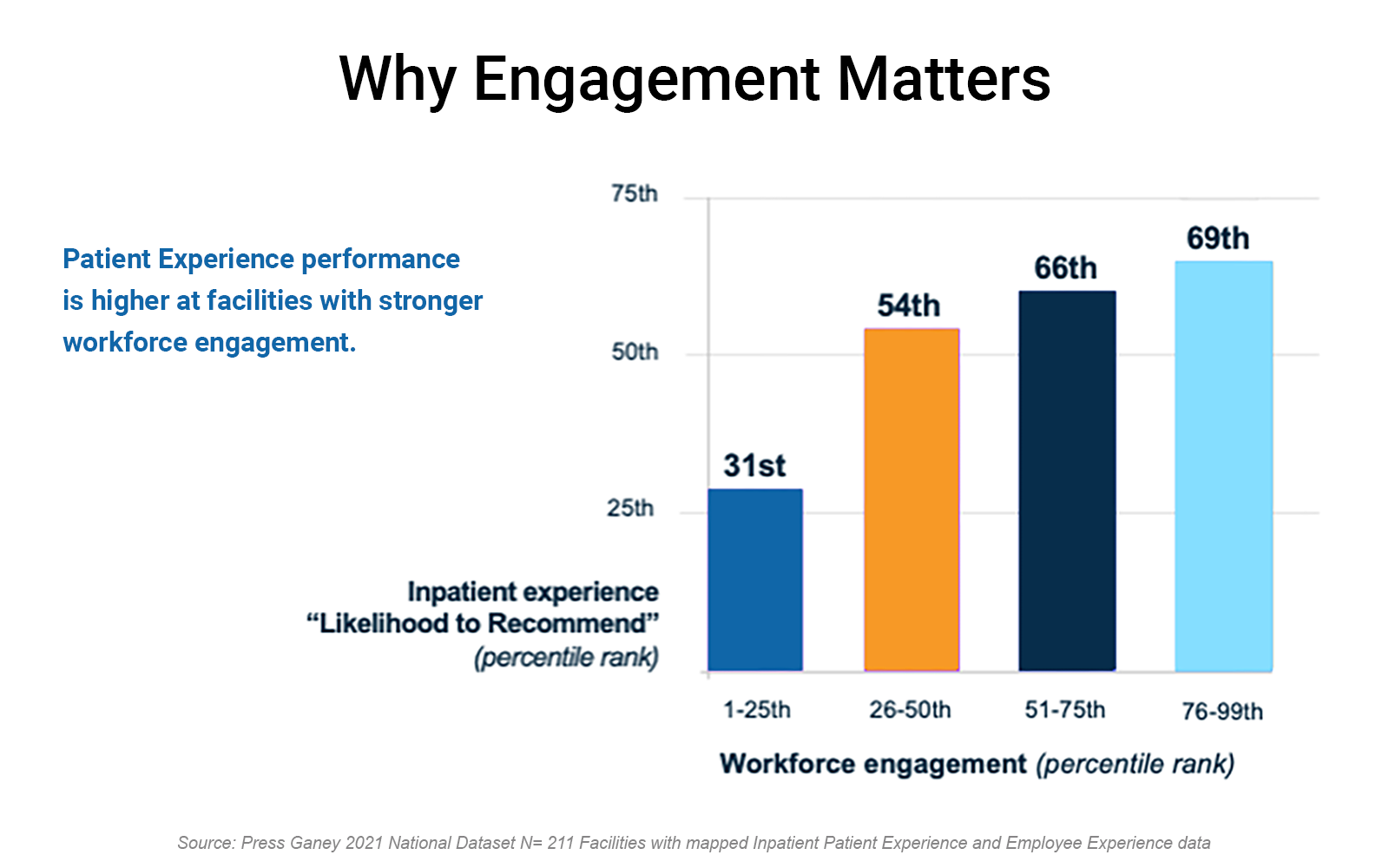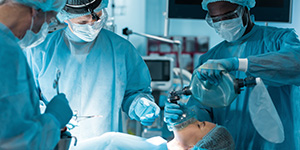Although highly technical, the field of medicine is also extremely personal. When we aren’t administering lifesaving care, clinicians spend most of our time interacting with our patients—underscoring the vital importance of strong clinician engagement. Healthcare technology plays an indispensable role, helping clinicians improve patient outcomes, enhance efficiency, and facilitate innovation in treatment and overall healthcare delivery. In this blog, we’ll highlight the importance of intuitive solutions, their impact on clinician job satisfaction, and how they help clinicians deliver the best care possible.
The State of Clinician Engagement in Healthcare
Research into clinician engagement reveals that healthcare organizations in the of engagement performers score, on average, 38 percentile points higher on “likelihood to recommend” than healthcare organizations in the bottom 25% of engagement performance. There’s no doubting the critical link between clinician engagement and its impact on patient experience. Yet many clinicians, especially those new to their profession, still experience challenges to engaging fully. A few of these challenges include:
- Heavy Workload: Excessive work demands, long hours, and high patient loads often lead to burnout and reduced job satisfaction.
- Insufficient Resources: Inadequate staffing, outdated equipment, and limited resources can impede clinicians’ ability to provide optimal patient care, leading to dissatisfaction.
- Challenging Work Environment: Hostile or stressful work environments, lack of support from colleagues or supervisors, and inadequate communication can negatively impact job satisfaction.
- Emotional Toll: Dealing with emotionally challenging situations, such as patient suffering or loss, without adequate support systems can contribute to job dissatisfaction.
- Financial Pressures: Economic factors, such as low compensation, insufficient benefits, or concerns about job security, can contribute to dissatisfaction among clinicians.
- Lack of Recognition: A lack of recognition and appreciation for the work clinicians do can contribute to feelings of undervaluation and reduced job satisfaction.
Addressing each of these issues requires a comprehensive approach that draws together systemic and individual factors to create a supportive, fulfilling work environment for clinicians, improve patient care, and deliver better healthcare outcomes overall.

Understanding Intuitive Solutions
In healthcare, an intuitive solution is one that is clear, straightforward, and easy to understand. Using it should come naturally without extensive explanation or guidance.
User-friendly interfaces like the Astopad and Norm-O-Temp display clear, easy to read controls, making deployment fast and effective—especially in emergency situations. NasaClip is an example of lower tech medical equipment that’s still extremely intuitive, featuring a simple design clinicians can easily insert and adjust to fit every patient comfortably. Reusable tourniquet cuffs feature color-coded, clearly labeled cuffs for easy differentiation and efficient use.
Each of these solutions prioritizes medical device usability, simplifying tasks and improving workflow for clinicians by enhancing controls and readability, standardizing processes, and streamlining application. As technology becomes increasingly integrated into healthcare, the burden on clinicians is steadily lifted, empowering them to connect and engage more fully with patients and deliver the best outcomes possible.
Enhancing Patient Care through Intuitive Solutions
As clinicians, our top priority is to continually improve the healthcare outcomes of our patients. Intuitive solutions play a pivotal role in improving patient care by streamlining healthcare processes, fostering accurate diagnoses, and optimizing treatment plans. For example, user-friendly Electronic Health Record (EHR) interfaces enable clinicians to quickly access and update patient information, reducing administrative burden and enabling more focused patient interactions.
Clinician satisfaction and improved patient outcomes are inherently intertwined. When clinicians have access to intuitive tools and technologies that enhance their workflow, reduce administrative complexities, and provide valuable decision support, it contributes to higher job satisfaction. Satisfied clinicians are more likely to engage effectively with patients, leading to improved communication, adherence to treatment plans, and overall better patient experiences. Reduced burnout and enhanced job satisfaction among clinicians contribute to a more stable and motivated healthcare workforce, ultimately benefiting patient safety and care through increased attentiveness and commitment to delivering high-quality care.
Future Trends in Intuitive Healthcare Technology
The healthcare landscape is constantly evolving, especially with the increased integration of intuitive solutions driven by emerging technologies. Innovations in healthcare such as Artificial Intelligence (AI), machine learning, and data analytics are increasingly utilized to interpret large amounts of patient data, providing clinicians with valuable insights for effective, personalized care. These intuitive solutions not only enhance diagnostic accuracy but also streamline administrative tasks, reducing the burden on clinicians.
The integration of intuitive solutions in healthcare is instrumental in shaping the landscape of modern medicine. Clinician engagement is a linchpin for optimal patient care, with technology playing a pivotal role in addressing challenges and improving job satisfaction. The identified challenges, such as heavy workloads, insufficient resources, and emotional toll, underscore the importance of intuitive solutions in alleviating these burdens and fostering a supportive work environment. Intuitive tools, exemplified by user-friendly interfaces and innovative medical equipment, enhance clinicians’ capabilities, enabling them to connect more deeply with patients and deliver superior healthcare outcomes.
The connection between clinician satisfaction and improved patient outcomes is critical to any conversation about clinician engagement. As intuitive solutions continue to empower clinicians in their roles, job satisfaction rises, leading to enhanced patient satisfaction and overall improved experiences. Looking forward, the evolving landscape of intuitive healthcare technology, driven by AI, machine learning, and data analytics, emphasizes the need for continuous learning and adaptation. Staying informed and embracing ongoing education ensures that healthcare professionals are well-equipped to leverage emerging technologies, contributing to a more efficient, patient-centric, and resilient healthcare system. Ultimately, the pursuit of intuitive solutions not only transforms the clinician’s experience—but also elevates the quality of care, fostering a healthier future for both healthcare professionals and their patients.
We’re ready to help deliver positive patient experiences and better clinical outcomes. Get in touch with us for more information about our innovative solutions.









